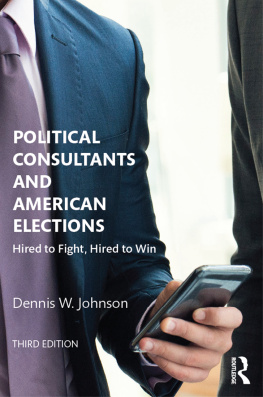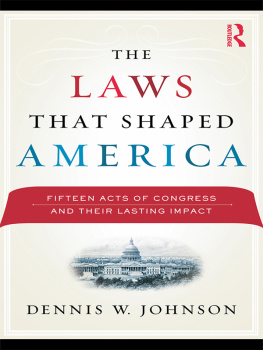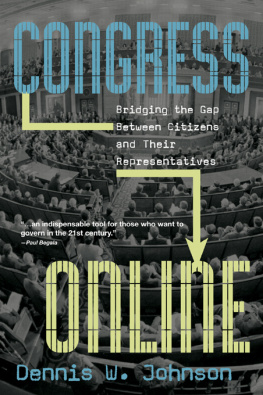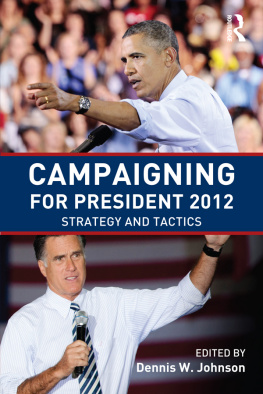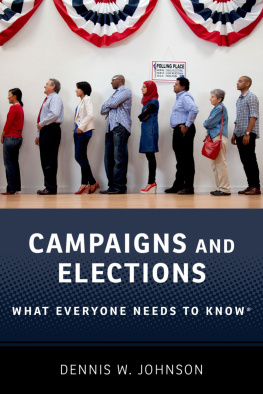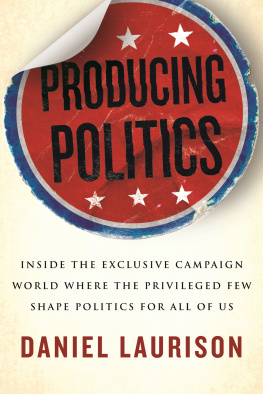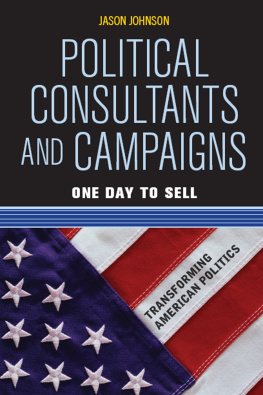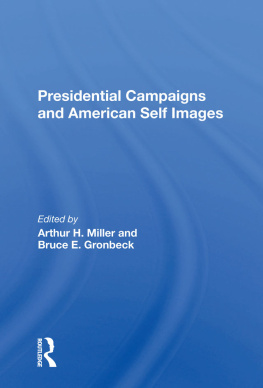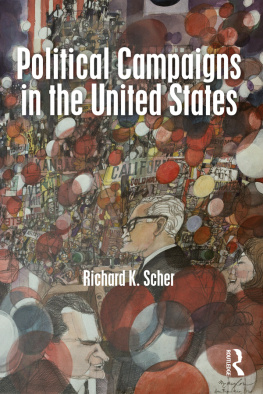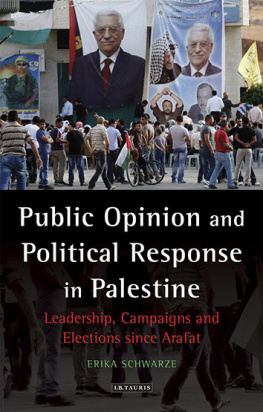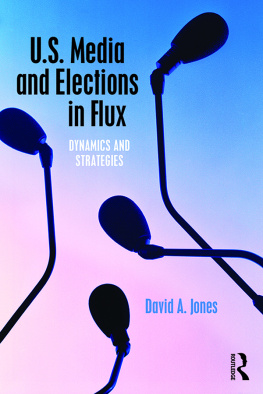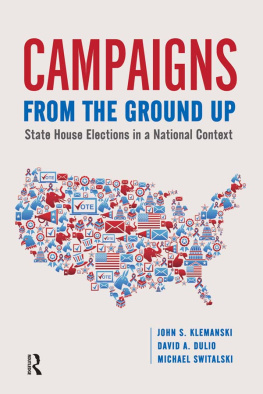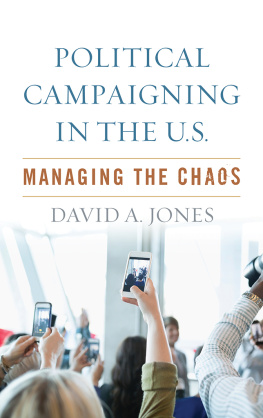Political Consultants and American Elections
Third Edition
When it comes to elections, campaigns matter. And a modern, sophisticated American campaign relies heavily on political consultants and seasoned operatives. Consultants help define the race, develop strategy and tactics, conduct candidate and opposition research, explore the mood of the public through qualitative and quantitative survey research, use both old media and new online communication tools to persuade voters, and employ complex technologies to mobilize voters. At all levels of the electoral arena, modern campaigns cannot hope to be effective without the guiding disciplines of professional consultants.
This thoroughly updated edition of Dennis W. Johnsons classic text, originally titled No Place for Amateurs, highlights the growing importance of social media, targeting and analytics, Super PACs and dark money in a post-Citizens United world.
Dennis W. Johnson is professor emeritus and former associate dean of the George Washington University Graduate School of Political Management.
First published 2016
by Routledge
711 Third Avenue, New York, NY 10017
and by Routledge
2 Park Square, Milton Park, Abingdon, Oxon, OX14 4RN
Routledge is an imprint of the Taylor & Francis Group, an informa business
2016 Taylor & Francis
The right of Dennis Johnson to be identified as author of this work has been asserted by him in accordance with sections 77 and 78 of the Copyright, Designs and Patents Act 1988.
All rights reserved. No part of this book may be reprinted or reproduced or utilised in any form or by any electronic, mechanical, or other means, now known or hereafter invented, including photocopying and recording, or in any information storage or retrieval system, without permission in writing from the publishers.
Trademark notice: Product or corporate names may be trademarks or registered trademarks, and are used only for identification and explanation without intent to infringe.
Library of Congress Cataloging in Publication Data
A catalog record for this book has been requested
ISBN: 978-1-138-78635-6 (hbk)
ISBN: 978-1-138-78636-3 (pbk)
ISBN: 978-1-315-73187-2 (ebk)
Typeset in Garamond
by FiSH Books, London
M uch has changed and much has remained constant in the world of campaigns, elections, and professional political consulting since the previous edition of this book, written in 2007. Two presidential elections, the most expensive in history, were conducted, and, particularly in the two Obama presidential campaigns, we saw the formidable application of technology and digital communication. For many years, campaigns had been experimenting with the tools of microtargeting, sophisticated algorithms, and online communication. But, in 2008, we experienced a breakthrough. The Obama Online Operation, so-called Triple-O, a staff of about thirty rewrote history by integrating online technology and presidential campaigning. The McCain forces were close behind in applying and integrating technology, but always seemed a step or two behind Obama. The 2012 presidential race saw even greater deployment of technology, with the Obama team spending well over $100 million to seek out, identify, and persuade voters, and get them to the polls.
In the past decade, there have been enormous changes in online communication. When the last edition of this book was being prepared, the iPhone was just being launched as the new revolutionary device, the smart phone. In 2007, MySpace was still an important social media site. Facebook had 20 million users in April 2007; by March 2013, it had 1.1 billion. Twitter had not been invented yet, neither had Pinterest; Reddit was still in its infancy. Few people had ever heard of an avatar and the idea of smart phone apps was still a year away. Just as our lives have become more and more plugged in, so too have our political campaigns, and their attempts to convince and mobilize voters.
Another very important change in campaigns and elections has been the explosion of money coupled with the emergence of Super PACs (political action committees), 527 groups and social welfare organizations employing independent expenditures on behalf of candidates, or (more often) against candidates. The 2008 presidential election cost about $1.6 billion; that was nearly twice the cost of the 2004 presidential election, and triple the cost of the 2000 election. The 2012 presidential contest cost even more, with over $2 billion raised and spent by the candidates, political parties and outside groups. But what was different in 2012 was the extent of money coming from super wealthy individuals. In an unsuccessful effort to beat Obama, the Koch brothers, Charles and David, and the committees they created, spent over $400 million, while casino billionaire Sheldon Adelson spent over $150 million.
The biggest impetus for such spending came from a U.S. Supreme Court decision in early 2010 that struck down federal bans on corporate money in campaigns. Now corporations, wealthy individuals, and labor unions could spend as much as they wanted, without having their names or the amounts of their campaign contributions disclosed, and often hiding behind innocuous-sounding organizational names. News organizations quickly dubbed this new hidden money as dark money. Now, it seemed, the gates were wide open for targeted and lavish spending to try to support or defeat candidates for office, all hiding under the label of independent expenditures. The campaign finance reforms enacted in 2002 have now been almost completely eviscerated and it has become a wild west of spending in presidential and congressional campaigns.
The public mood has soured; the voters trust in elected officials, from members of Congress to the president, has sunk alarmingly. During the second term of George W. Bush, the public became exasperated. There seemed to be renewed hope, however, with the historic election of Barack Obama, but inaction, gridlock, and intense partisan sniping have eroded Americans trust and confidence in all forms of government. One result was the emergence of the Tea Party movement, which has displayed a visceral distaste for all things Obama, and which has brought a near civil war within the Republican Party. The country seems more and more divided, politically and culturally, and the public discourse gets more raw and unpleasant.
With these new political and campaign realities has come a change in the title of this book. The original title, No Place for Amateurs, reflected a different era. So much has happened in the past fifteen years: increases in citizen engagement, partisan activism, microtargeting and campaign technology, and investments of money into campaigns, that a change in title was necessary.
Consultants are often vilified, blamed for the negative and cynical tone of campaigns, and seen as unwanted filters between candidates and potential voters. The mid-term elections of 2010, which saw the ascendance of Tea Party winners, were particularly nasty, with vicious, personal attacks against candidates and boat-loads of money spent to convince voters and get them out to the polls. The 2014 mid-terms, with control of the U. S. Senate at stake, were equally as vicious, with record-setting amounts of money poured into them by outsiders. And without missing a beat, we begin preparing for the 2016 presidential election. America truly is the land of elections and the land of political consultants.

